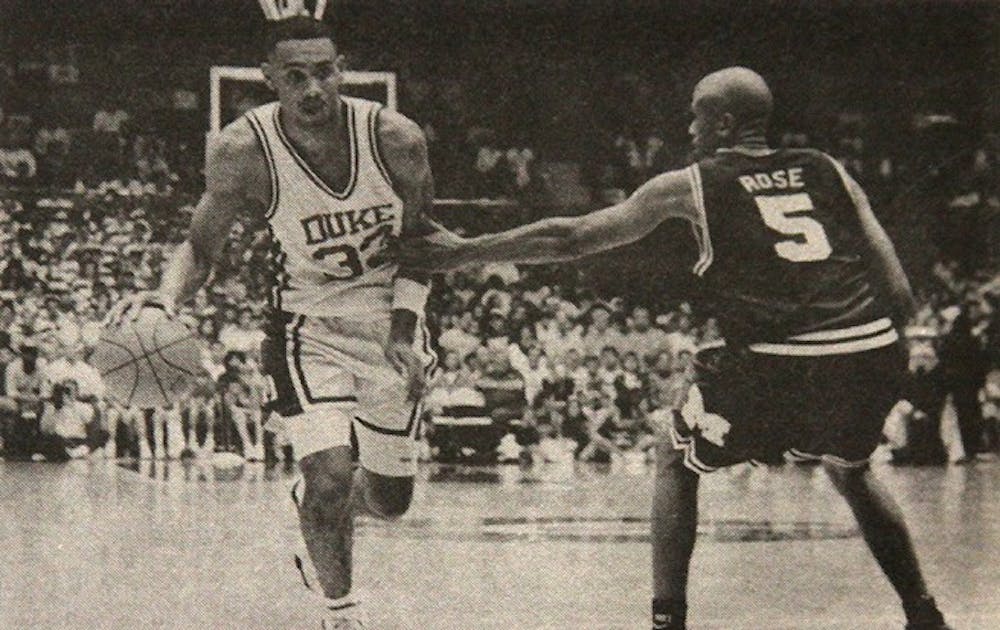When former Duke star Grant Hill announced his retirement from professional basketball last Saturday, he left behind a career that spanned 18 NBA seasons that included seven All-Star appearances, a Rookie of the Year award and five All-NBA selections.
Tack two national championships, two All-American honors and an Olympic gold medal onto Hill’s resume, and he steps away from the game as one of the most accomplished players of his generation.
But what may be more important than the championships and accolades is the lasting legacy Hill has left on the game of basketball at both the professional and college levels.
The biggest stars of today’s NBA are players like LeBron James and Carmelo Anthony, who pose a deadly combination of size and athleticism with their ability to create on the perimeter. Hill was one of this mold’s original prototypes.
“I think he changed the game in a lot of ways,” said Bobby Hurley, who teamed up with Hill for back-to-back national championships at Duke in 1991 and 1992. “He was a guy who had size at 6-foot-8 and handled the ball like a point guard, made decisions like a point guard and created like a point guard. When he went to the NBA, I think he paved the way for a lot of players who came after him to see how he played the game.”
After falling in the national title game to Arkansas in his senior season, Hill was the third overall selection in the 1994 NBA Draft by the Detroit Pistons. He spent his first six seasons in Detroit and took the NBA by storm, earning All-Star selections in five of his first six seasons.
By the end of his sixth NBA season, Hill had amassed 9,393 points, 3,417 rebounds and 2,720 assists. The only three players in NBA history to top these scoring, rebounding and assist totals in their first six seasons are James, Larry Bird and Oscar Robertson.
Following Michael Jordan’s second retirement in 1999, the NBA was in search of its next big star. When Hill was traded to the Orlando Magic and given an opportunity to team up with Tracy McGrady, many thought Hill would be the one to answer the call, but ankle injuries put an early end to Hill’s prime. He appeared in just 47 games in his first four seasons with Orlando, and his career was nearly ended by a life-threatening staph infection.
Ultimately, it would be these debilitating injuries that marked Hill’s NBA career.
“You always wonder, ‘What if he didn’t get hurt?’ Because he was on his way to being possibly one of the top 10 guys to ever play,” said Duke associate head coach Jeff Capel, who played with Hill during his freshman season with the Blue Devils. “Before he got hurt, there was an argument of who was the best player in the world because Jordan was out, and he was very deep into that argument.”
Hill recovered from his injuries and played two more seasons in Orlando, five in Phoenix and one final season with the Los Angeles Clippers. After spending the better part of his career battling through injuries, a 40-year-old Hill retired from the NBA as the league’s oldest player.
Capel said that it was Hill’s competitive drive that allowed him to recover from what might have been career-ending injuries for other players.
“Not one time did I ever hear him say, ‘Why me?’ He was always positive—he thought he was going to attack this and overcome it,” Capel said. “He never made an excuse.”
It was not his injury history, but Hill’s grace both on and off the court that would cement his legacy at Duke.
Hill’s college career is best remembered for two of the quintessential Duke basketball highlights—his 75-foot pass to Christian Laettner in the 1992 Regional Final against Kentucky and the monstrous lob dunk he stuffed home in the Blue Devils’ 1991 national championship victory against Kansas.
But aside from his highlight-reel athletic feats, Hill’s teammates recall memories of their teammate’s quick wit and talents on the piano.
“The word swag didn’t exist—but he had it. Just the way he carried himself, everything he did. There were a lot of guys who wanted to be like Grant,” Capel said. “One of the major reasons I came to Duke was because of Grant.”
Even Hill’s retirement announcement was an example of his easy-going and modest nature. Rather than schedule a large press conference, Hill casually addressed his retirement as a guest on TNT’s NBA Tip-Off by saying, “I’m done.”
One of 13 players to have his jersey retired in Duke basketball history, Hill moves forward from his professional basketball career with a number of options on the horizon. It is speculated Hill’s next career move could be as a television analyst or coach, but Hurley suggested a different path for his former teammate.
“For me, Grant was most likely out of anyone I’ve come across in basketball to be President of the United States,” Hurley said. “He’s articulate, he’s been raised in a great family and he’s got a great education and a good head on his shoulders. He’s always trying to help people and he’s always great to be around. So I’m sure that he’s going to be able to do just about anything that he wants.”
Get The Chronicle straight to your inbox
Signup for our weekly newsletter. Cancel at any time.

